Key takeaways:
- Networking is about building meaningful connections rather than simply exchanging contact information, often leading to unexpected opportunities.
- Effective networking involves active listening and engaging genuinely with others, which fosters deeper relationships and knowledge exchange.
- Common networking mistakes include dominating conversations, neglecting follow-ups, and lacking clear intentions, which hinder the development of valuable connections.
- Successful networking can enhance professional growth, boost confidence, and drive creativity in approaches to challenges, ultimately benefiting customer experience.
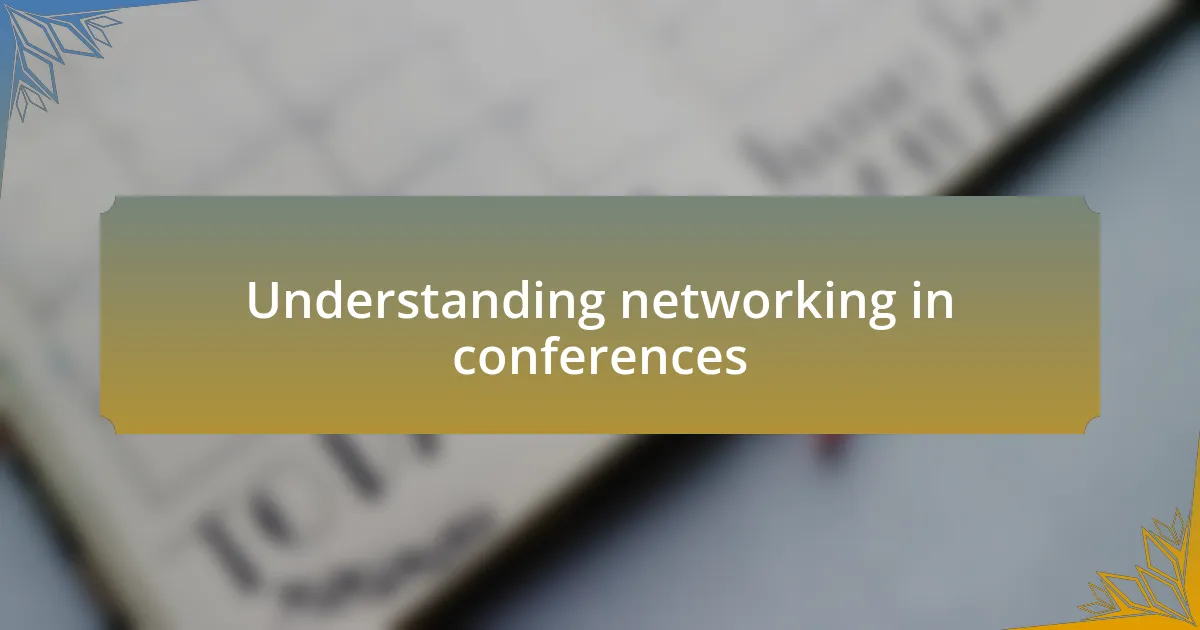
Understanding networking in conferences
Networking at conferences goes beyond exchanging business cards; it’s about forging meaningful connections. I remember a time when I hesitated to introduce myself to a speaker I admired. The fear of rejection clouded my judgment, but I eventually approached him. That short conversation not only sparked a friendship but opened doors to opportunities I hadn’t anticipated.
When I reflect on my networking experiences, I realize that the best conversations often happen spontaneously. I once stumbled into a discussion during a coffee break, where I shared my thoughts on customer experience trends. Little did I know that the person I was speaking to would later become a mentor. Isn’t it fascinating how one unplanned moment can lead to profound relationships?
Understanding the dynamics of networking involves embracing the discomfort of stepping out of your comfort zone. I often ask myself, what’s the worst that could happen? In my experience, the benefits of taking that leap far outweigh the potential awkwardness of initial interactions. Each conversation holds the promise of insights and collaborations that can enrich your professional journey.
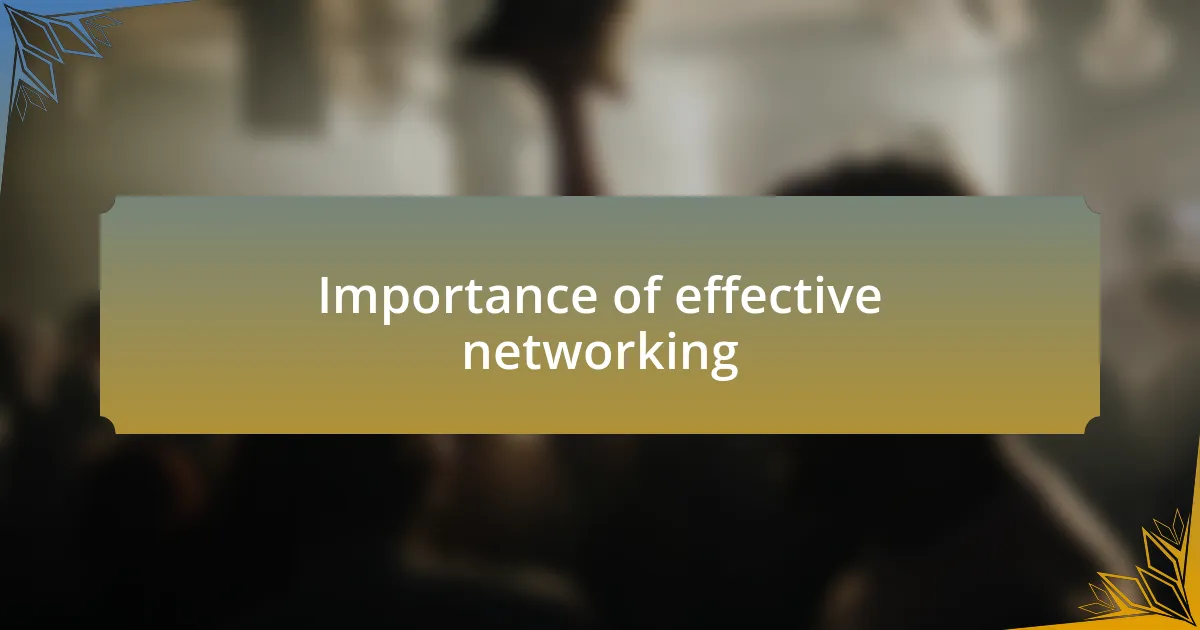
Importance of effective networking
Effective networking is crucial in shaping our professional paths. I vividly recall a time when I attended a workshop without knowing anyone. Initially, I felt isolated, but after striking up a conversation with a fellow attendee about a shared interest in customer experience, we discovered common ground. That simple interaction not only alleviated my anxiety but also led to a collaborative project that had a lasting impact on my career.
Moreover, effective networking doesn’t just expand your circle; it enriches your knowledge base. I once joined a small breakout session where I listened to someone discuss their challenges in customer engagement. By asking questions, I gained valuable insights that transformed my approach. Have you ever considered how a single exchange can completely shift your perspective? This kind of learning is often underappreciated.
Ultimately, the strength of our professional relationships hinges on our ability to communicate effectively. I remember a networking event where I actively listened more than I spoke. By engaging with others’ stories, I built genuine connections. Isn’t it amazing how sometimes, letting others share their experiences can open pathways to collaboration and understanding? Each interaction is an opportunity waiting to unfold, if only we take the time to nurture it.
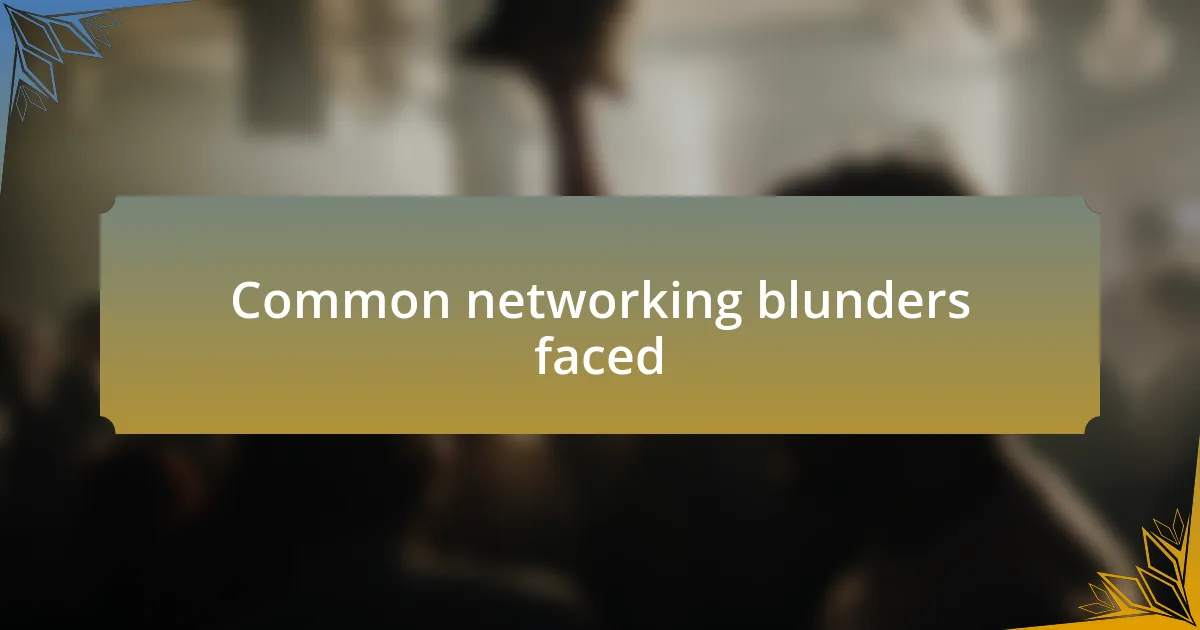
Common networking blunders faced
When I look back at my own networking journey, one common blunder stands out: the tendency to dominate conversations. I recall a particular event where I was so focused on sharing my achievements that I failed to truly listen to others. This not only alienated some potential connections but also left me missing out on valuable insights they could have offered. Have you ever been in a situation where you realized you were talking more than you were listening? It’s a reminder that genuine networking thrives on balance.
Another frequent pitfall I’ve encountered is neglecting follow-up. After a lively exchange with someone about innovative customer experience strategies, I promised to send over some resources. However, life got busy, and I lost track. When I finally remembered weeks later, I felt embarrassed. If only I had made it a point to follow through sooner! Keeping the momentum alive is essential—how often do we let great opportunities slip because we forget the importance of nurturing connections?
Lastly, there’s the challenge of attending events without a clear intention. I once attended a large conference, overwhelmed by the crowd. Without a specific goal or focus in mind, I ended up drifting from one conversation to another, often feeling more exhausted than enlightened. I learned that setting clear objectives before attending can transform my experience. Have you considered what you hope to achieve before networking? This clarity can guide your interactions and lead to meaningful connections that align with your goals.
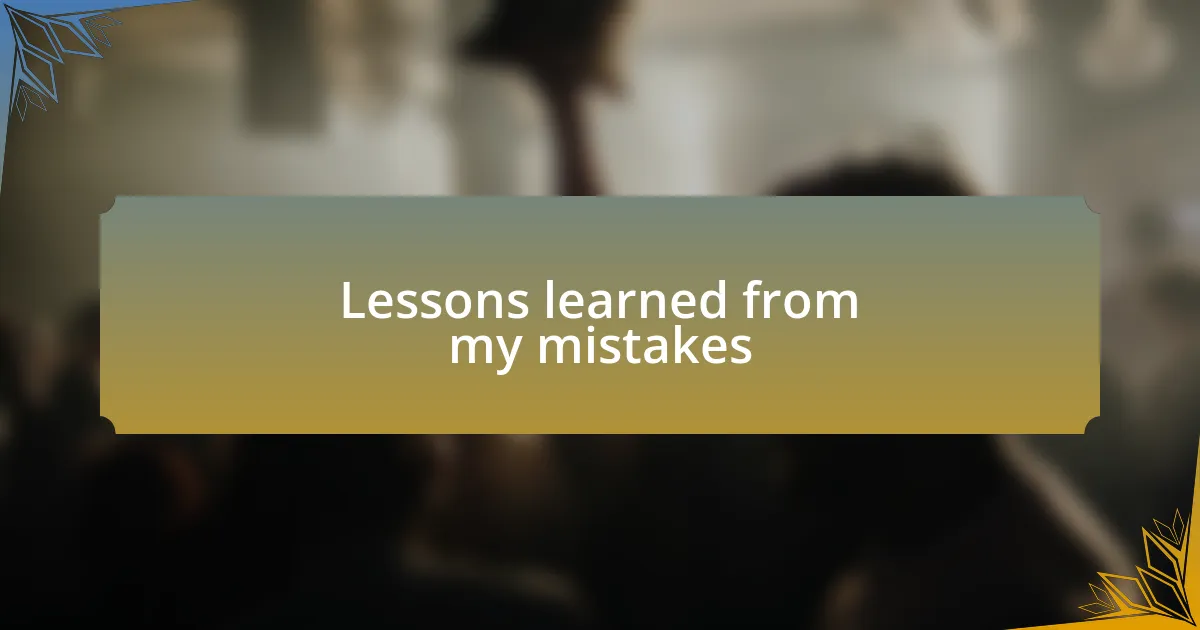
Lessons learned from my mistakes
When I think about my networking blunders, one lesson that surfaces is the importance of body language. At one networking event, I stood rigidly in the corner, arms crossed, not realizing I was creating a barrier between myself and others. Looking back, I realize how much my physical stance communicated a lack of openness, which deterred people from approaching me. Have you ever felt the invisible wall that some people unintentionally put up?
Another significant mistake I made was attempting to connect with everyone in the room. During a particularly crowded seminar, I flitted from one conversation to another, scattering my attention and leaving relationships half-formed. It wasn’t until much later that I understood the value of quality over quantity in networking. Focusing on a few key conversations can lead to deeper connections, don’t you think?
Lastly, I’ve learned the hard way that being unprepared can cost you valuable opportunities. I once entered a discussion about the latest trends in customer experience without any knowledge of the topic. I felt my confidence wane as I scrambled to keep up, wishing I had taken the time to research beforehand. Preparation may seem tedious, but it can make all the difference. Have you ever felt caught off guard in a conversation? Being equipped with knowledge not only boosts your confidence but also enhances the quality of interactions.
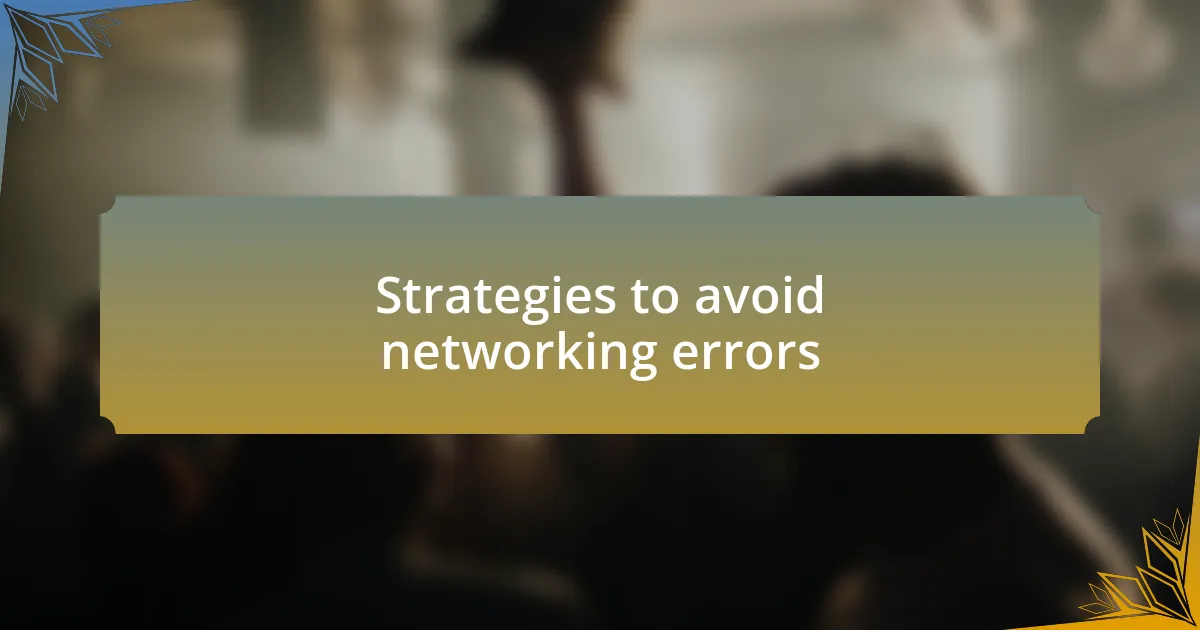
Strategies to avoid networking errors
One strategy to avoid networking errors is to practice active listening. I recall a time when I dominated a conversation at a networking dinner, barely allowing others to chime in. Afterward, I wasn’t sure what anyone had actually said, which left me feeling disconnected. Engaging fully in conversations can build rapport and show genuine interest; don’t you value when someone truly listens to your ideas?
Another effective approach is to prepare a few conversation starters in advance. I often used to walk into events with no clear agenda, feeling awkward as silence filled the gaps. This changed when I started thinking about specific topics or questions to bring up. It sounds simple, but having a strategy can ease the tension and create smoother interactions, allowing you to connect more authentically.
Finally, being mindful of follow-ups can cement those new relationships you’ve worked hard to build. I once met a fascinating individual and thought, “I’ll reach out later,” only to lose their contact details amidst a pile of business cards. Now, I write down key points from conversations right away, which serves as a personal reminder to connect later. Have you ever wished you had followed up on a potentially valuable connection? Taking that extra step can turn casual meetings into meaningful relationships.
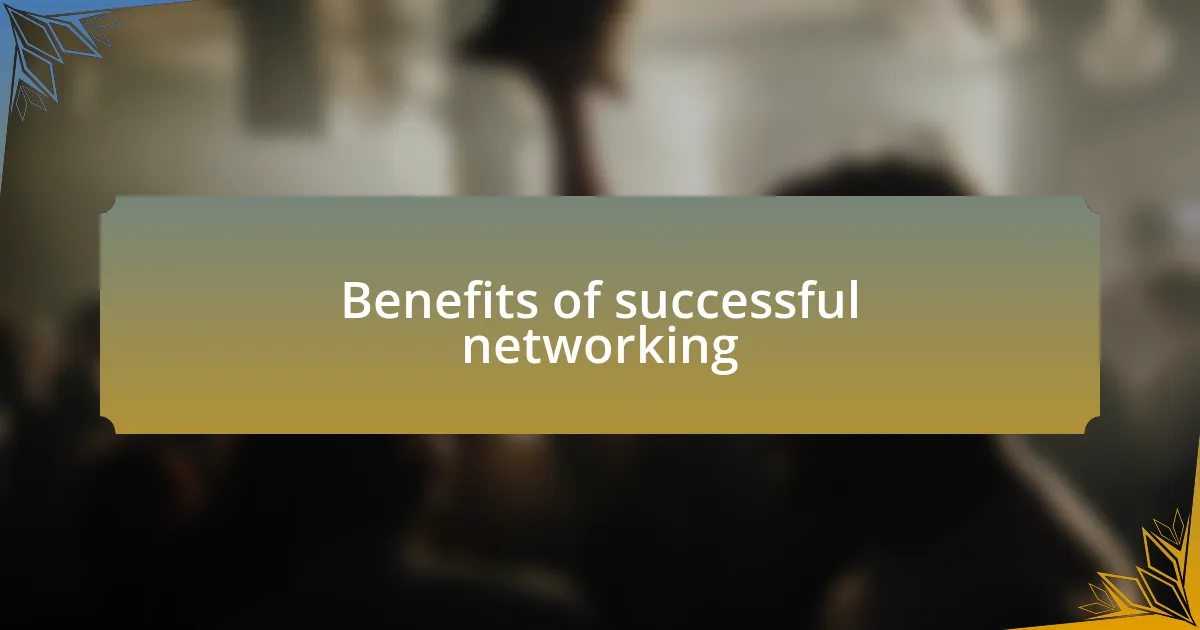
Benefits of successful networking
Successful networking can lead to invaluable connections that open doors to new opportunities. I remember joining a circle of professionals at a seminar and quickly discovering a shared passion for customer experience. That one conversation resulted in collaboration on a project, showcasing how meaningful relationships can lead to tangible benefits in one’s career. Doesn’t it feel rewarding to see your efforts bear fruit in such a way?
Another significant benefit is the knowledge exchange that occurs during networking. I once met a mentor who offered insights into navigating industry challenges. His perspective transformed the way I approached my work, demonstrating how these interactions can enhance our skill sets and broaden our understanding. Have you ever walked away from a conversation feeling inspired or better equipped to face a challenge?
Moreover, successful networking can bolster your confidence and personal brand. Each connection reinforces your presence in the industry, which can be incredibly empowering. I recall feeling nervous as I shared my ideas at a conference; however, the encouraging feedback I received helped me grow more comfortable in my voice. Isn’t it amazing how a supportive network can uplift us, encouraging us to take risks we might otherwise avoid?
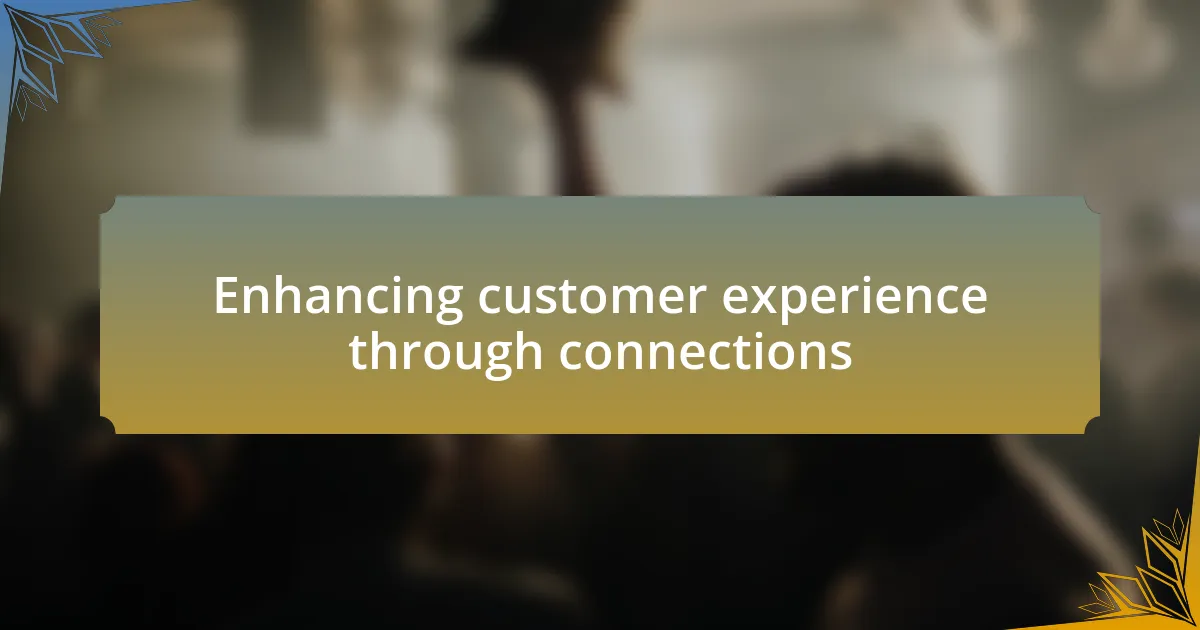
Enhancing customer experience through connections
Building strong connections can dramatically enhance customer experience by creating feedback loops that drive improvement. For instance, during a small networking event, I met a customer service manager who shared her experience with gathering customer feedback through informal conversations. Hearing her story made me rethink how effectively I gathered insights, reminding me that sometimes, the best information comes from casual discussions rather than structured surveys. Have you considered how informal chats might spark valuable revelations?
Moreover, collaborating with others fosters a sense of community that can resonate deeply with customers. I once partnered with a marketing professional after meeting at a conference, and together, we crafted a campaign that spoke directly to our audience’s needs. The result wasn’t just increased engagement; it created a lasting connection with our customers, making them feel valued and understood. Isn’t it incredible how genuine connections can lead to more tailored experiences?
Lastly, networking can ignite creativity that enhances customer service. There’s a unique energy that comes from brainstorming with others. I vividly remember a brainstorming session with peers where we shared our biggest customer service challenges. The diverse perspectives not only inspired new strategies but also reminded me of the importance of thinking outside the box in our approach. How often do you find yourself energized by the ideas that come from connecting with others in your field?